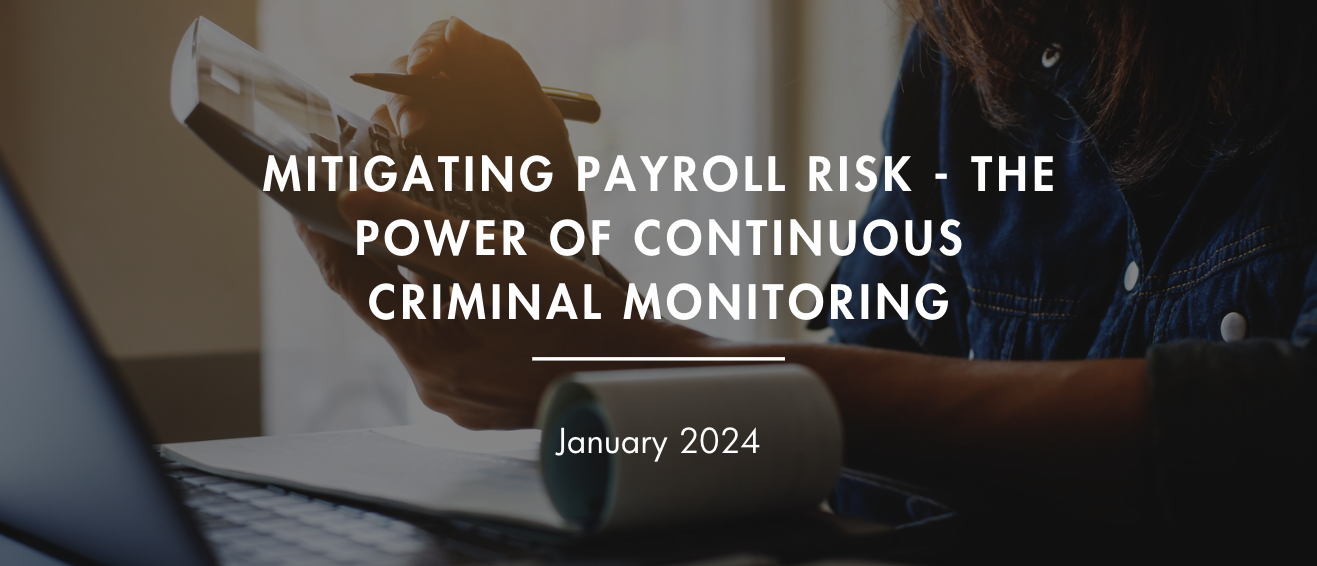Payroll management is a critical aspect of any business, ensuring employees are compensated accurately and on time. However, with the increasing complexity of regulatory compliance and the evolving nature of the workforce, payroll-related risks have become more pronounced. One area that demands careful attention is the risk associated with employing individuals either with existing criminal backgrounds and/or having employees who commit criminal acts subsequent to being hired. To address this concern, businesses are turning to continuous criminal monitoring as a proactive and effective solution.
Understanding Payroll Risk
Payroll risk is multifaceted, encompassing errors, fraud, and compliance issues. One significant but often overlooked aspect is the potential risks associated with hiring employees with criminal histories and/or having employees engage in criminal activity after they are hired. These risks can range from theft and embezzlement to workplace violence to a plethora of other crimes, and they pose a threat not only to the organization’s finances but also to its employees and overall safety.
Traditional hiring practices involve pre-employment background checks, but they are often a one-time assessment. Continuous criminal monitoring takes a more dynamic approach, recognizing that circumstances can change after the initial screening. By regularly checking employees’ criminal backgrounds, businesses can stay informed about potential risks and take appropriate action in a timely manner.
The Benefits of Continuous Criminal Monitoring
Continuous criminal monitoring involves ongoing checks of employees’ criminal records to identify any new convictions that may pose a risk to the organization. This real-time approach is particularly valuable in industries where the nature of the work or access to sensitive information demands a high level of trust and security.
- Real-time Risk Identification: Continuous criminal monitoring provides businesses with real-time updates on employees’ criminal records. This allows employers to swiftly identify any new convictions that may impact the individual’s suitability for their role. By staying informed, organizations can take immediate action to mitigate potential risks.
- Regulatory Compliance: Many industries have stringent regulations regarding the employment of individuals with certain criminal backgrounds. Continuous monitoring helps businesses remain compliant with these regulations by ensuring that they are aware of any changes in their employees’ criminal records that may affect their eligibility for their current positions.
- Enhanced Workplace Safety: Workplace safety is a top priority for organizations. By continuously monitoring employees’ criminal backgrounds, businesses can proactively address potential threats to the safety and well-being of their workforce and their customers. This contributes to creating a secure work environment and fosters a culture of trust among employees.
- Protecting Company Brand and Reputation: The reputation of a company is closely tied to the actions of its employees. Discovering criminal activity among staff members can have severe consequences for a company’s brand image. Continuous criminal monitoring helps protect the organization’s brand and reputation by minimizing the likelihood of continuing to employ individuals with a new occurrence of criminal behavior.
- Reducing the Risk of Fraud: Employees with criminal backgrounds, particularly those involved in financial crimes, may pose a higher risk of engaging in fraudulent activities within the organization. Continuous criminal monitoring acts as a preventive measure, reducing the likelihood of such incidents and safeguarding the company’s financial assets.
In an era where businesses face numerous challenges, mitigating payroll risk is a top priority. Continuous criminal monitoring emerges as a powerful tool, providing organizations with the means to stay ahead of potential threats and safeguard their employees, assets, and reputation. By adopting this proactive approach to payroll risk management, businesses can foster a secure and compliant work environment, ensuring the sustained success of their operations.
As always, employers should seek out a reliable background screening company that is also a consumer reporting agency (CRA). All background checks are covered by the Fair Credit Reporting Act (FCRA), and by seeking a reliable CRA partner, your organization can help ensure its compliance with this regulation.
Posted by: Rudy Troisi, L.P.I., President and CEO, Reliable Background Screening
Copyright © 2024, Reliable Background Screening, a Division of Marcett, Inc. All rights reserved.


